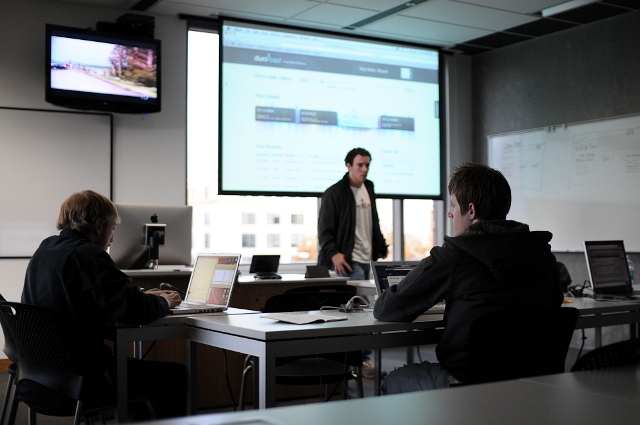I had a fantastic time talking with Bryce Clemmer and Elliot Swan from DuroCast (a startup featured on MusicKO just last week – check the review here). Below you will find the first part of our conversation. There’s lots and lots to read and ponder. And when you have finished, give Part 2 of the interview a good look, too.

Durocast's HQ
Full Name: Bryce Clemmer
Age: 22
Startup: DuroCast
Position: Co-founder & Operations Director
Full Name: Elliot Swan
Age: 21
Startup: DuroCast
Position: Co-founder & Creative Director
PART I
THE STARTUP
Tell us a little about your startup. Where did the idea come from? Was it fully translated into the finished product?
BC: DuroCast is an online portal for all terrestrial radio. The idea initially came from me sitting in my dorm room sophomore year at college wondering what some friends were listening to on the other side of the country. DuroCast is not a finished product and we are continually evolving. There are great things in the works.
ES: Bryce came to me in May 2009 with an idea for creating an online radio hub, and at that time, Matt had created a barebones, searchable directory. After that, it took about 6 months to develop into a solid private beta. Since then, we’ve completely reworked the site and just launched less than a week ago with what we have now. Like Bryce said, DuroCast will never be a finished product—that’s one of the great things about the Internet, it’s always on the move!
What are its best features? What will make people who try DuroCast keep coming back to it?
BC: Everything in the world is social, and DuroCast is and will become increasingly more social. It has helped many users find and share their most favorite stations and radio shows. DuroCast also allows you to save and organize your favorites to an easily accessible dashboard.
ES: DuroCast already is a great way to keep track of your favorite stations and find new ones that you’ll love just as much. I’m even more excited though about some things we have brewing that will help really reinvent radio as an even greater medium.
What was the exact launch date?
BC: Monday, November 8, 2010
Living in South America, I was very pleased to see that you support territories other than the US. Which other parts of the world are meant to be supported next? Is Europe a priority to you? And what features can we expect to see implemented in future revisions?
BC: We do have some South American stations covered, and we cover all of North America. Europe is absolutely a priority to us, and we are looking at bringing in many more international stations. I can’t go into detail about future revisions, but we have some very cool things planned.
ES: One cool thing about the site is that we let users submit new radio stations, so really anywhere users take initiative could be put up on the site. We are also working on expanding our database on our end.
There is a certain tendency to demonize the Internet in the music industry. I think it is all a matter of perspective – it all depends on the uses it is put to. What is your opinion? In which areas has the Internet left an unquestionably positive mark?
BC: I would not say that the Internet is looked at as a “demonizer” from the music industry’s perspective, but that the Internet in their eyes has not efficiently capitalized and provided the desired returns that have been expected from the music industry. I think the Internet has left an unquestionably positive mark on making all content more open and transparent. Communication today via the Internet is extremely more transparent and seamless, allowing great content to be shared much quicker and on demand.
ES: I think a lot of the demonizing of the Internet has been an unfair blame shift from the record companies who didn’t move quickly enough. Napster showed us that people want songs individually and instantly, and that effectively changed the music industry forever. While the RIAA tried to reverse that shift through lawsuits, Apple took a bet that if there was a way to do that safely and legally, people would be willing to pay for it. And guess what? They were right.
What advice could you give to anybody who is launching a music-related startup in the future? What are the obvious mistakes that should be avoided?
BC: Don’t be afraid to take a risk, if it is good and solves a widespread problem it will succeed. No matter how perfect and mistake free you try to be, mistakes will be made. Work fast and be able to learn from any mistakes that arise and adapt even faster.
ES: Learn everything you can about the industry and the market and talk to as many people as you can, then do something. The biggest mistake you can make is to not try.
Read Part 2 of this interview.


Pingback: Bryce Clemmer & Elliot Swan (DuroCast) – Interview (Part 2) | MusicKO
Pingback: Month In Review – November 2010 | MusicKO